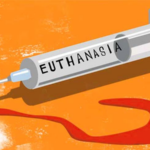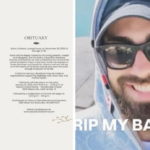MAiD / Euthanasia
Canada’s euthanasia activists will not be happy until every life-affirming institution is destroyed
Some of you may remember the powerful, heartbreaking story of 81-year-old Christine Nagel, the Canadian woman – who doesn’t approve of tattoos – who had the phrase “Don’t Euthanize Me” tattooed on her upper arm, just to ensure that no medical practitioner could ever claim that she’d requested a lethal injection. Amanda Achtman recorded her story for the “Dying to Meet You” project:
For the same project, Achtman recently interviewed Roger Foley, a Canadian man with disabilities who has been offered euthanasia multiple times (I interviewed Foley here on LSN last week). Foley says that being offered euthanasia feels like a profound violation – that he feels as if he is hanging off a cliff and that medical practitioners are stomping on his fingers. But this is the reality in Canada’s euthanasia regime: a lethal injection can be offered even to those struggling with suicidal ideation and those in their weakest and most vulnerable moments.
This, Achtman noted, highlights the essential need for institutions that are exclusively life-affirming. “There’s a need for euthanasia-free healthcare spaces, not only to protect the integrity of Catholic institutions but also because many patients—including nonreligious patients like Foley—wanted to be treated in facilities that don’t raise euthanasia with patients,” she wrote. She’s right. The difficulty is that these spaces – where they exist – have become targets for suicide activists who want euthanasia offered everywhere.
The Delta Hospice Society, for example, fought euthanasia activists for years – simply for the right not to offer assisted suicide. After a protracted struggle, British Columbia’s Fraser Health forced the DHS to turn over the building over their refusal to cooperate with the euthanasia regime – a building purchased with funds donated largely by pro-life supporters. As LSN reported last month, the DHS is now launching a “Do Not Euthanize” registry to protect vulnerable Canadian patients. Suicide activists are now targeting St. Paul’s Hospital in downtown Vancouver and challenging a ban on euthanasia in all Catholic Church-run hospitals.
Proponents of Canada’s euthanasia regime will not be happy until every life-affirming environment has been utterly transformed, and they are attempting to drive opponents of assisted suicide and euthanasia out of every institution – or force collaboration and complicity. Dr. Jerome Lejeune, the famed pro-life pediatrician and geneticist, once observed: “A day will come when clinics will put a sign on their door: ‘Here we do not kill,’ and patients will rush to these places of life.” It is true – but unfortunately, euthanasia activists are rushing to them, as well.
But as euthanasia researcher Alexander Raikin noted, some institutions are holding firm and openly declaring their opposition to the regime. “Over the past couple years, posters like this have been popping up across Canada,” he wrote on X. One poster was from L’Arche Canada. “This organization WILL NOT recommend, suggest, or refer you to Medical Aid in Dying as an alternative to assisting in obtaining the necessary supports and services you require,” it reads. “You are safe here.”
Another nearly identical poster, from Inclusion Canada: “You are important. You are valuable. Your needs are important. This organization WILL NOT recommend, suggest, or refer you to Medical Aid in Dying as an alternative to assisting in obtaining the necessary supports and services you require. You are safe here.” It is heartbreaking that it needs to be said, but such is life – and death – in Trudeau’s Canada.
Lejenune was right. Despite the hostile opposition we face in Canada, creating “places of life” for people to flee to is essential. We must commit ourselves to taking care of our elders. We must advocate for them in all medical spaces. We must seek out places where vulnerability will be respected, not exploited with offers of “MAiD.” Canada’s euthanasia regime is likely to get worse before it gets better, and we should be prepared for that. For as American ethicist Stanley Hauerwas once wrote: “In a hundred years, if Christians are identified as people who do not kill their children or the elderly, we will have done well.”








